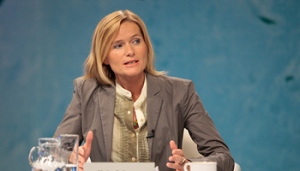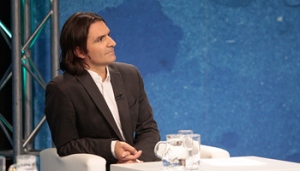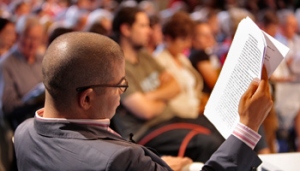 Jens Petersen (Bild: ORF/Johannes Puch)
Jens Petersen (Bild: ORF/Johannes Puch)
A second story about death
Andreas Schäfer’s “Auszeit” (Time out) marked the end of the second day of readings. The jury only agreed about one thing: the text “makes you want more” – however, a bit more “ferocity” (Mangold) would have done the text some good.
The text by the German author talks about the social decline of a pilot, who, after the death of his son, falls into social isolation and away from his self-created non-committance and distance.
Fleischanderl: “This text does not touch you!”
“I think this is a very strong text, particularly contemporary and unspectacular”, is how Hildegard Elisabeth Keller opened the discussion, which continued hesitantly: Karin Fleischanderl described Schäfer’s text, which is “without slip-ups but also without suspense” as a “German television play”. Dealt with in a linear narrative fashion, this text, unlike the one by Petersen, does not touch her “at all”.
 Meike Feßmann, Alain Claude Sulzer (Bild: ORF/Johannes Puch)
Meike Feßmann, Alain Claude Sulzer (Bild: ORF/Johannes Puch)
In this text, death is merely an “incidental catalyst”
Heike Feßmann said: “Every detail of the text is told well – also as a good portrait of a man.” The son’s death, however, only serves as an incidental catalyst to throw the father off-course. “That makes it all a little eerie. While the other text does some blackmailing with death, this one deals with it in too nonchalant a way.”
“The prose is not that of a television play”
“But the subject matter is different here”, said Alain Claude Sulzer in defence. “This is about taking time out from your job, which is described in great detail – the non-committance somehow seems to come with the job as pilot.” Although very precisely crafted, he believes, the text does not try to be “linguistically original” – which is precisely what makes it stand out.
The “wealth of images” contributes to the story – the prose is “not that of a television play at all”, says Sulzer in Fleischanderl’s direction. “Grief made him autonomous, this is formally contained in the text. It is so smooth and precise, just like the man’s life.”
 Andreas Schäfer (Bild: ORF/Johannes Puch)
Andreas Schäfer (Bild: ORF/Johannes Puch)
A clear and credible story
“The text holds back a lot – the element of keeping the reader distant is truly without fault, but to what extent does the text go beyond this?”, Burkhard Spinnen asks. From a psychological viewpoint the story is “told in a very clear and credible way”.
Paul Jandl compared the text with Jans Petersen’s: “There is much less depth of narrative here.”
 Ijoma Mangold (Bild: ORF/Johannes Puch)
Ijoma Mangold (Bild: ORF/Johannes Puch)
Mangold would like something “a little wild”
Ijoma Mangold was of the same opinion: “It is crafted in a careful and insightful way and fulfils its own narrative programme – the desire remains, however, that there could “have been something a little more” – he would have liked to see something “a little wild”.
Barbara Johanna Frank
translated by expectTranslations